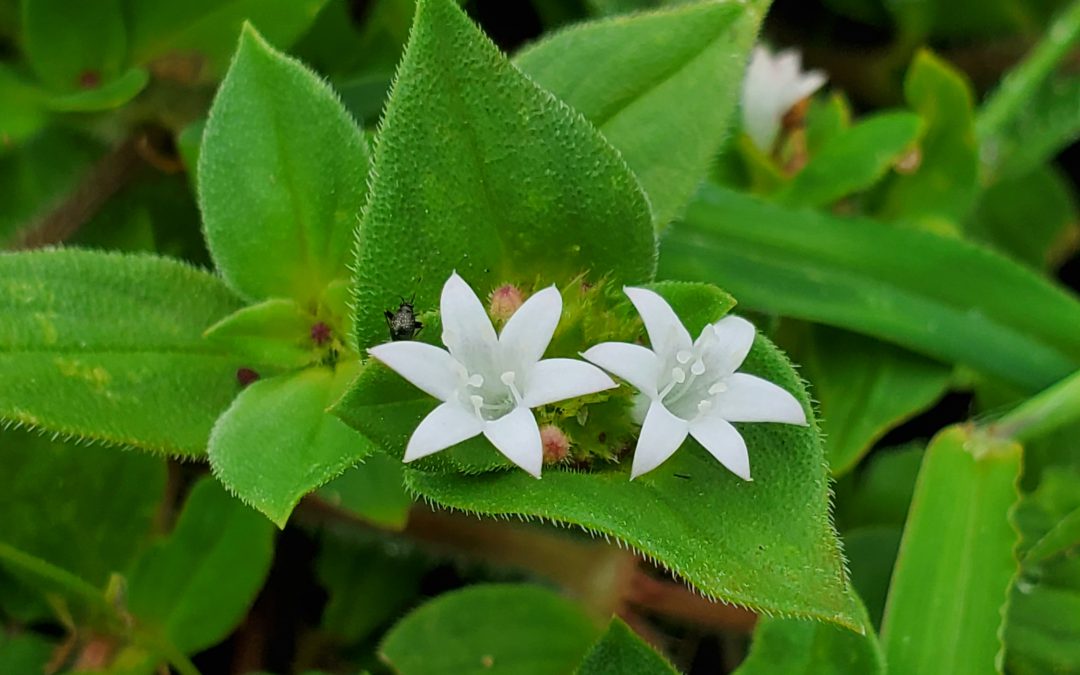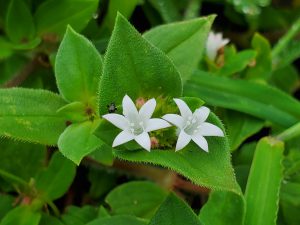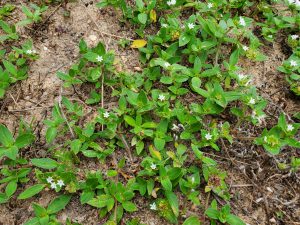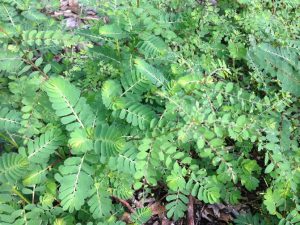
Pusley Control in Florida Turfgrass
Florida pusley and its relatives, Brazilian and large-flower pusley, are common sights in lawns and landscapes during the summer. These prolific and tenacious weeds are closely related species in the genus Richardia, in the Rubiaceae family which includes coffee, bedstraw, and the plant from which the emetic ipecac is derived. With their thick leaves, low and spreading growing habit, and bright white flowers, they can quickly take over bare spots in a lawn and become quite a nuisance.
Because bare spots are a magnet for pusley (and weeds in general), one method to help prevent this weed from becoming a problem is to ensure the turfgrass is as healthy as possible. Well established grass can outcompete many other competitors. Keeping a lawn in tip-top shape includes watering properly, mowing at the recommended height for the grass species and variety, fertilizing appropriately, and controlling pests and diseases in a timely fashion. This can take some work in North Florida’s hot, humid climate, but prevention is almost always easier than trying to cure a problem.
Florida pusley is quickly noticed as soon as it flowers. While some may find the flowers attractive, they set seeds swiftly and before you know it, the next generation of plants is ready to go. Surprisingly, they are also an important nectar plant for honeybees. If chemical control is warranted for an infestation, a pre-emergent herbicide may help. Timing is important for this, so keep an eye on the thermometer – pre-emergents should be applied in the spring (February or March) when temperatures reach 65-70 degrees Fahrenheit for four to five days in a row. Examples are products with active ingredients such as atrazine or pendimethalin, though atrazine should not be used on bermudagrass or bahiagrass.
For weed problems that are already established, there are post-emergent herbicides available. In bahia, bermuda, and zoysia, products containing 2,4-D (or mixtures, such as 2,4-D and dicamba) can work fairly well. These products may require two applications to adequately control pusley. Be aware that some herbicides are sold under trade names that may be confusing, such as Roundup for Southern Lawns, which is a mixture of 2,4-D and penoxsulam, and is labeled for use on bahia, bermuda, St. Augustine, and zoysia grasses . It does not contain glyphosate, and Roundup that DOES contain glyphosate will kill turfgrass as well as weeds. Check the active ingredients on the herbicide label.
In St. Augustine lawns, options are more limited. Homeowners with St. Augustine may want to consider contacting a lawn care company for help with pusley. The available herbicides that are labeled for use in this instance are either difficult to use or prohibitively expensive (The herbicide Celsius, for example, costs over $100 per 10 oz. bottle). Another chemical that is effective is metsulfuron, and while it can be used in bermuda and zoysia lawns as well, it comes with some serious difficulties. First and foremost, it can be taken up by the roots of plants and is NOT safe to use around trees or shrubs. Properly measuring the chemical is tricky, as it may take only a single ounce to treat a whole acre. Serious damage can be done to surrounding plants if it is mixed or used improperly, and as such it may be difficult to find at local stores.
Homeowners who choose an herbicide to control pusley or any weed should be aware that high temperatures during the Florida summer can cause chemicals to affect the grass as well. St. Augustine is especially prone to this, and some herbicides such as 2,4-D may affect grasses more when temperatures rise above 85-90 degrees Fahrenheit.

A closeup of Florida pusley flowers.
Treatment of pusley and weeds in general is most effective when the plants are young. Large pusley plants have deeper roots and may take more applications of herbicides to control effectively. Furthermore, of the pusley species that can be found in our area, large-flower pusley is more difficult to control and may be tolerant of some chemicals. For more information, contact your local Extension office.
-Evan Anderson, Walton County Horticulture Agent



